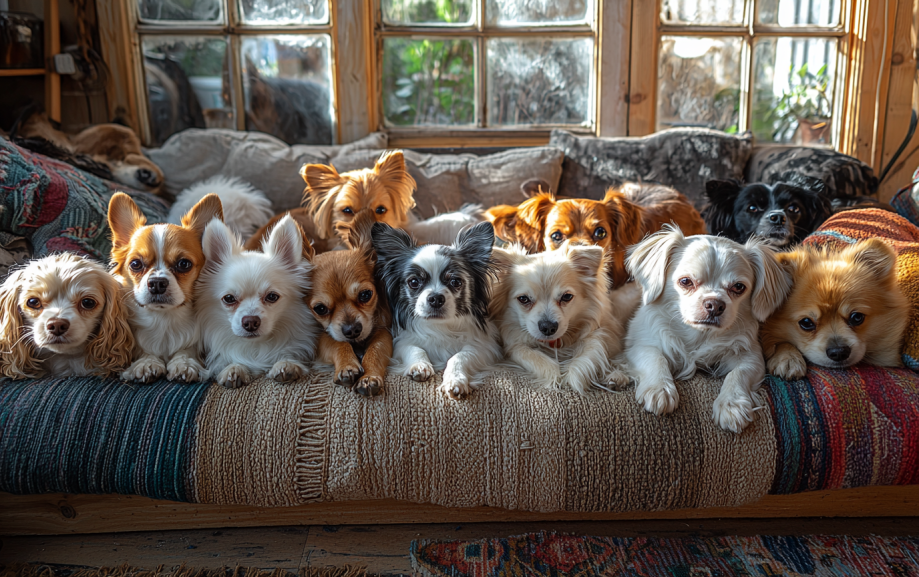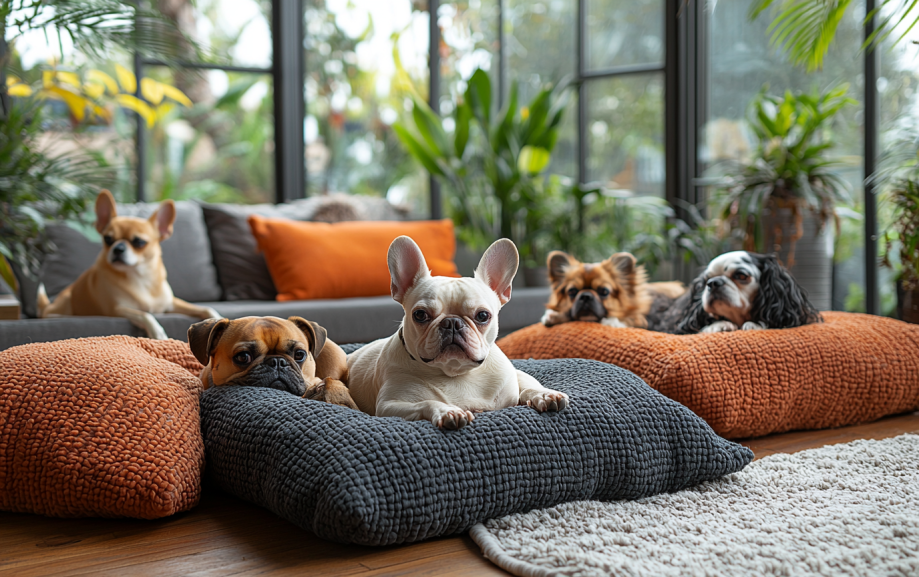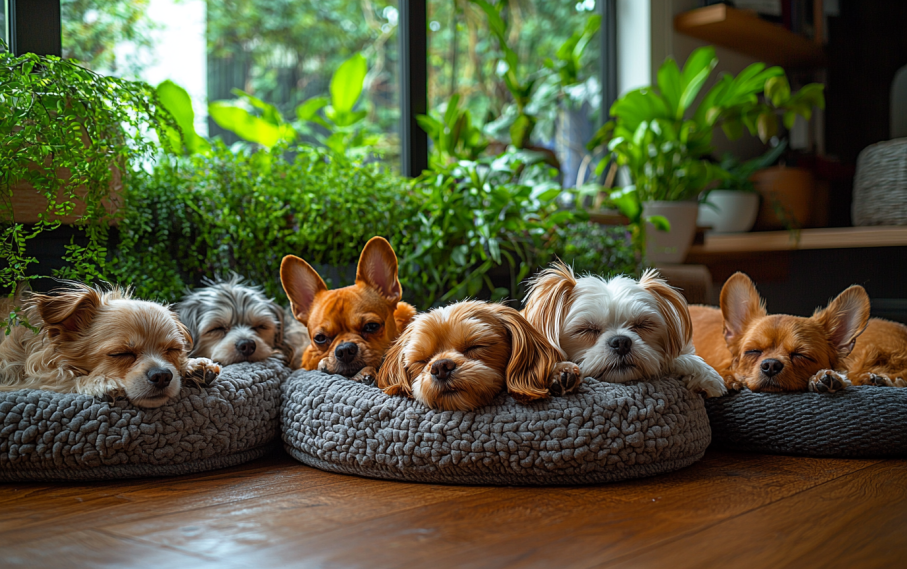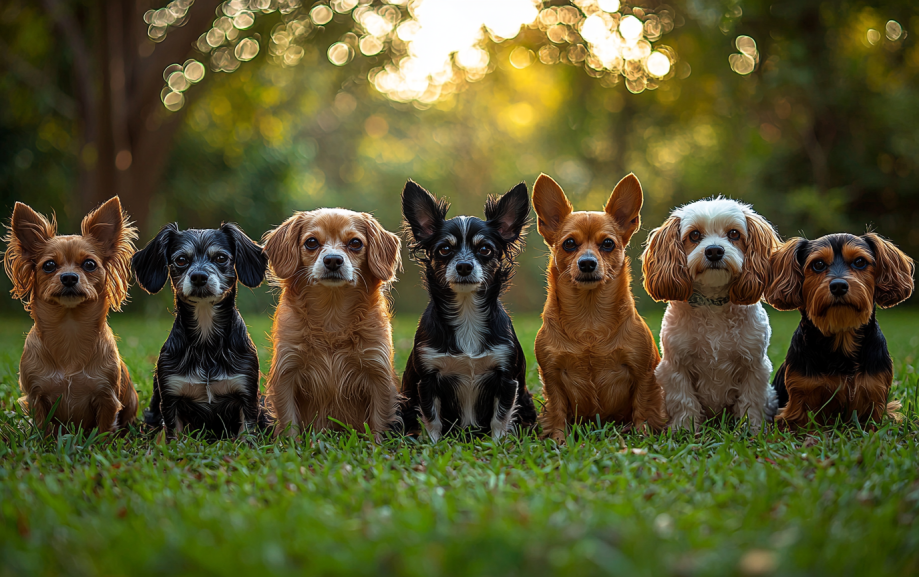Factors to Consider When Choosing a Small Dog Breed
Finding the ideal small dog begins with understanding your own lifestyle and how a dog can fit into it. Here are key factors to consider when selecting the best breed for you.
Living Space (Apartment vs. House)
Your living situation plays a significant role in determining which small dog breed is right for you. For instance, while many small dogs are well-suited to apartment living, some breeds may still need a backyard or ample space to roam around.
- Apartment Living: Breeds like French Bulldogs, Pugs, and Chihuahuas are low-energy and compact, making them perfect for smaller spaces.
- House with Yard: If you have more room to offer, breeds like Dachshunds or Jack Russell Terriers, who love to explore, might be a good fit.
Activity Level
Your daily routine and energy level will directly impact your dog’s happiness. Some small dogs are content with short walks and lounging, while others require more vigorous activity to stay happy.
- Active Owners: Breeds like Jack Russell Terriers and Miniature Pinschers have high energy and thrive with owners who can provide plenty of playtime and walks.
- Low-Energy Owners: If you prefer a calmer lifestyle, breeds like Shih Tzus or Bichon Frises are lower-energy and will be content with less exercise.
Temperament and Personality
Just like people, dogs have unique personalities. Some small dog breeds are more independent, while others are eager for constant attention and affection. You’ll want to find a breed whose temperament fits with your household dynamic.
- Independent Breeds: Some breeds, such as Dachshunds, can be more self-reliant and content with their own company.
- Affectionate Breeds: Breeds like Cavalier King Charles Spaniels or Havanese are known for being incredibly affectionate and love being lap dogs.
Family Dynamics (Children, Other Pets)
If you have children or other pets, you’ll want to choose a small dog breed that is known for being social and family-friendly.
- Kid-Friendly Breeds: Breeds like Beagles, Cocker Spaniels, and Pugs are known for their patient, friendly nature and are great with children.
- Coexisting with Other Pets: If you have other pets, such as cats, consider breeds like Maltese or Papillons, who tend to get along well with others.
Maintenance and Grooming Requirements
Some small dog breeds require more grooming than others, so it’s essential to factor in the time you’re willing to dedicate to this aspect of pet care.
- Low Maintenance Breeds: Breeds like the Italian Greyhound or Boston Terrier have short coats and require minimal grooming.
- High Maintenance Breeds: Breeds like Shih Tzus, Lhasa Apsos, and Poodles need regular grooming and care to keep their coats in top shape.
Health and Lifespan
Small dogs tend to live longer than larger breeds, but they can still face health challenges. Research the common health issues of each breed to understand what medical care might be required.
- Healthier Breeds: Breeds like Chihuahuas and Toy Poodles generally enjoy good health and long lifespans, often reaching 15 years or more.
- Breeds with Common Health Concerns: French Bulldogs and Pugs are prone to respiratory issues due to their short snouts, so they may require more frequent vet visits.
Small Dog Breeds for Different Lifestyles

Now that you know the factors to consider, let’s explore some of the best small dog breeds based on different lifestyles.
READ ALSO: Top 10 Most Popular Dog Breeds
Small Dogs for Active Owners
If you’re someone who loves outdoor activities like running, hiking, or long walks, these breeds can keep up with your active lifestyle:
- Jack Russell Terrier: Full of energy, intelligence, and enthusiasm, Jack Russells are perfect for active owners who can provide plenty of stimulation.
- Miniature Pinscher: Often described as a big dog in a small body, these dogs are highly energetic and love to explore.
Low-Energy Small Breeds for Busy or Sedentary Lifestyles
For those with a more relaxed lifestyle or less time for exercise, consider these breeds:
- Shih Tzu: Known for their calm, affectionate demeanor, Shih Tzus are content lounging around and need only moderate exercise.
- Bichon Frise: These fluffy companions are playful but don’t demand much exercise, making them ideal for less active owners.
Family-Friendly Small Breeds
If you have kids and are looking for a dog that’s gentle and playful, consider:
- Beagle: Beagles are known for being friendly, gentle, and great with kids. Their social nature makes them an excellent family pet.
- Cavalier King Charles Spaniel: Affectionate and easygoing, this breed is excellent with children and loves being part of the family.
Small Dog Breeds That Are Great for Seniors
Seniors looking for a loyal, easy-to-care-for companion should consider these breeds:
- Maltese: With a sweet temperament and minimal exercise needs, the Maltese is a perfect lap dog for seniors.
- Pug: These playful yet low-maintenance dogs are affectionate and great companions for older adults.
Best Small Dogs for Apartment Living

For apartment dwellers, small dogs that are less energetic and more adaptable to limited spaces are ideal:
- French Bulldog: Quiet and low-energy, French Bulldogs are perfect for smaller spaces and require minimal outdoor time.
- Chihuahua: Compact and easygoing, Chihuahuas adapt well to apartments and are content with a few short walks a day.
Small Dog Breeds That Are Easy to Train
If you’re a first-time dog owner or prefer a breed that’s easy to train, these intelligent breeds will make the process easier:
- Toy Poodle: Known for their intelligence and eagerness to please, Toy Poodles are quick learners and very trainable.
- Papillon: Papillons are one of the smartest small breeds and are highly obedient, making them great for first-time owners.
Travel-Friendly Small Dog Breeds
If you’re an avid traveler, you may want a dog that can easily accompany you on trips. Some small breeds are particularly well-suited for travel due to their compact size and adaptability.
- Chihuahua: These tiny dogs are easy to carry and travel with, whether by plane or car, and can adapt quickly to new environments.
- Italian Greyhound: Lightweight and calm, Italian Greyhounds are excellent travel companions and do well in various climates.
- Pekingese: Known for their independent yet adaptable nature, Pekingese dogs can be ideal for people who frequently travel.
Small Dogs That Are Great for Emotional Support
Small dogs can make wonderful emotional support animals due to their affectionate and calming nature. If you’re looking for a companion that can provide comfort and emotional stability, consider the following breeds:
- Cavalier King Charles Spaniel: Gentle and loving, this breed thrives on human interaction and offers great emotional support.
- Pomeranian: Despite their small size, Pomeranians are known for their loyalty and affection, making them a perfect emotional support dog.
- Havanese: Known for their friendly and social nature, Havanese are very attuned to their owner’s emotional needs.
Small Dog Breeds That Don’t Shed Much
For those looking to minimize pet hair in the home, small dog breeds that don’t shed heavily are ideal. These dogs are not only easier to maintain but are also great for people with allergies.
- Maltese: These dogs have a long, flowing coat but shed very little, making them a great hypoallergenic option.
- Miniature Schnauzer: With a wiry coat, this breed sheds minimally and is relatively low-maintenance when it comes to grooming.
- Yorkshire Terrier: Known for their silky, non-shedding coat, Yorkies are an excellent choice for homes where shedding is a concern.
Small Dog Breeds Known for Longevity

One of the many benefits of small dog breeds is their long lifespan. If you’re looking for a companion who will be with you for many years, these breeds are known for their longevity:
- Toy Poodle: Toy Poodles are one of the longest-living dog breeds, often living well into their teens.
- Dachshund: With proper care, Dachshunds can live long, healthy lives, often reaching 15 years or more.
- Shih Tzu: Shih Tzus can live for 15 years or more and are generally healthy dogs with good care and regular vet checkups.
Health and Lifespan Considerations for Small Dogs
Though small dogs often enjoy longer lifespans, they can still face specific health challenges. Understanding the common issues associated with each breed can help you prepare for future care.
Common Health Issues in Small Breeds
Certain small dog breeds are prone to genetic health problems. Here are a few examples:
- Respiratory Problems: Breeds like French Bulldogs and Pugs are prone to breathing difficulties due to their short snouts.
- Joint Issues: Dachshunds can suffer from back problems, particularly intervertebral disc disease, due to their elongated spines.
Tips for Ensuring a Long and Healthy Life
To give your small dog the best chance at a long, healthy life:
- Regular Vet Checkups: Frequent visits to the vet can help catch any potential health issues early.
- Balanced Diet and Exercise: Ensure your dog maintains a healthy weight to prevent issues like diabetes or heart disease.
- Dental Care: Small dogs are prone to dental issues, so regular brushing and checkups are essential.
Conclusion
Choosing the right small dog breed is a deeply personal decision that should be based on your lifestyle, living environment, and preferences. Whether you’re an active owner looking for an energetic companion or a senior seeking a loving lap dog, there’s a small dog breed out there perfectly suited for your needs.
With careful consideration of factors like activity level, temperament, grooming needs, and health concerns, you can find a loyal and loving companion that will bring joy and companionship to your life for years to come. Small dogs may come in tiny packages, but they have the potential to make a big impact on your heart and home.





